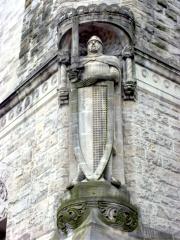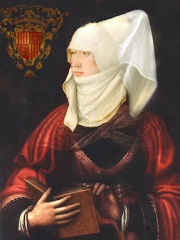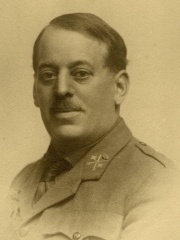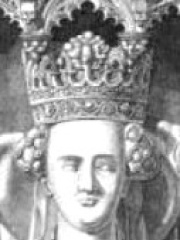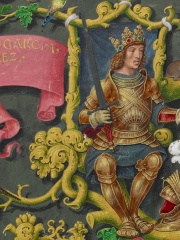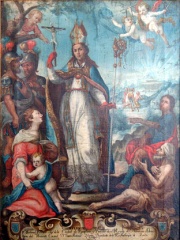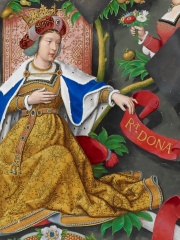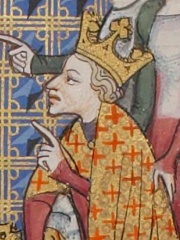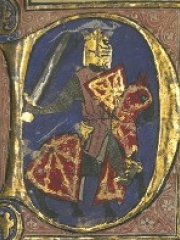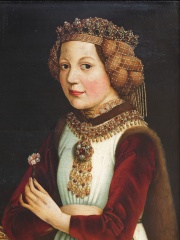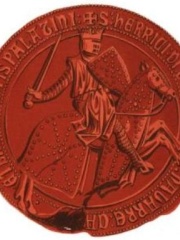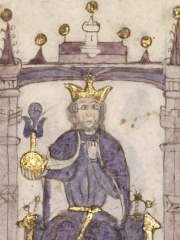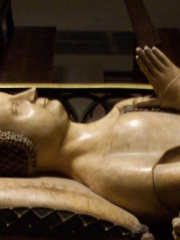 Pamplona
Pamplona
Pamplona ranks 195th in number of biographies on Pantheon, behind Abidjan, Nagoya, and Sheffield. The most famous people from Pamplona are Roland, Pablo de Sarasate, and Blanche I of Navarre. The most famous people who died in Pamplona are Infante Juan, Count of Barcelona, Charles II of Navarre, and Theobald I of Navarre. Pamplona has been the birth place of many soccer players, and politicians and the death place of many politicians, and companions. Pamplona is located in Spain.
Pamplona, historically also known as Pampeluna in English, is the capital city of the Chartered Community of Navarre in Spain. As of 2024, with a population of 208,243, it is the 29th largest city in Spain. Read more on Wikipedia
People
Between 0 and 2003, Pamplona was the birth place of 74 globally memorable people, including Roland, Pablo de Sarasate, and Blanche I of Navarre. Additionaly, 12 globally memorable people have passed away in Pamplona including Infante Juan, Count of Barcelona, Charles II of Navarre, and Theobald I of Navarre.
People Born in Pamplona
Go to all RankingsRoland
MILITARY PERSONNEL
736 - 778
HPI: 77.29
Rank: 1
Pablo de Sarasate
MUSICIAN
1844 - 1908
HPI: 73.53
Rank: 2
Blanche I of Navarre
POLITICIAN
1387 - 1441
HPI: 68.64
Rank: 3
José Sanjurjo
MILITARY PERSONNEL
1872 - 1936
HPI: 67.37
Rank: 4
Joan of Navarre, Queen of England
COMPANION
1368 - 1437
HPI: 66.00
Rank: 5
García Íñiguez of Pamplona
POLITICIAN
810 - 882
HPI: 63.95
Rank: 6
Fermin
RELIGIOUS FIGURE
272 - 303
HPI: 63.73
Rank: 7
Ion Andoni Goikoetxea
SOCCER PLAYER
1965 - Present
HPI: 61.68
Rank: 8
Muniadona of Castile
COMPANION
995 - 1066
HPI: 61.60
Rank: 9
Ignacio Zoco
SOCCER PLAYER
1939 - 2015
HPI: 61.59
Rank: 10
Toda of Pamplona
COMPANION
876 - 958
HPI: 60.98
Rank: 11
Najwa Nimri
ACTOR
1972 - Present
HPI: 60.66
Rank: 12
Newly Added People Born in Pamplona
Go to all RankingsFrançois Bustillo
RELIGIOUS FIGURE
1968 - Present
HPI: 52.94
Rank: 29
Clara Galle
ACTOR
2002 - Present
HPI: 45.21
Rank: 43
Ione Belarra
POLITICIAN
1987 - Present
HPI: 41.34
Rank: 53
Cristina Torrens Valero
TENNIS PLAYER
1974 - Present
HPI: 39.66
Rank: 57
Juan José Oroz
CYCLIST
1980 - Present
HPI: 38.05
Rank: 63
Beñat Prados
SOCCER PLAYER
2001 - Present
HPI: 35.41
Rank: 68
Nico Serrano
SOCCER PLAYER
2003 - Present
HPI: 35.30
Rank: 69
Javier Flaño
SOCCER PLAYER
1984 - Present
HPI: 34.42
Rank: 71
People Deceased in Pamplona
Go to all RankingsInfante Juan, Count of Barcelona
POLITICIAN
1913 - 1993
HPI: 73.75
Rank: 1
Charles II of Navarre
POLITICIAN
1332 - 1387
HPI: 70.88
Rank: 2
Theobald I of Navarre
POLITICIAN
1201 - 1253
HPI: 70.28
Rank: 3
Magdalena of France
POLITICIAN
1443 - 1495
HPI: 68.89
Rank: 4
Henry I of Navarre
POLITICIAN
1244 - 1274
HPI: 67.87
Rank: 5
Sancho VI of Navarre
POLITICIAN
1132 - 1194
HPI: 67.57
Rank: 6
Eleanor of Castile, Queen of Navarre
COMPANION
1363 - 1416
HPI: 65.55
Rank: 7
Toda of Pamplona
COMPANION
876 - 958
HPI: 60.98
Rank: 8
Sancha of Castile, Queen of Navarre
POLITICIAN
1137 - 1179
HPI: 60.67
Rank: 9
Rafael Frühbeck de Burgos
CONDUCTOR
1933 - 2014
HPI: 56.97
Rank: 10
Baltasar Albéniz
COACH
1905 - 1978
HPI: 56.02
Rank: 11
Fernando Serena
SOCCER PLAYER
1941 - 2018
HPI: 55.83
Rank: 12
Occupations
Most individuals born in present day Pamplona were soccer players (36), politicians (8), athletes (5), cyclists (4), and companions (3), while most who died were politicians (7), companions (2), conductors (1), coaches (1), and soccer players (1).
Occupational Trends
Over the past 100 years, soccer players have been the top profession of globally memorable people born in Pamplona, including Ion Andoni Goikoetxea, Ignacio Zoco, and Fernando Llorente. Whereas, throughout history, soccer players have been the profession with the most memorable people born in present day Pamplona, including Ion Andoni Goikoetxea, Ignacio Zoco, and Fernando Llorente.
Places
Overlapping Lives
Below is a visual represetation of the lifespans of the top 7 globally memorable people born in Pamplona since 1700.
